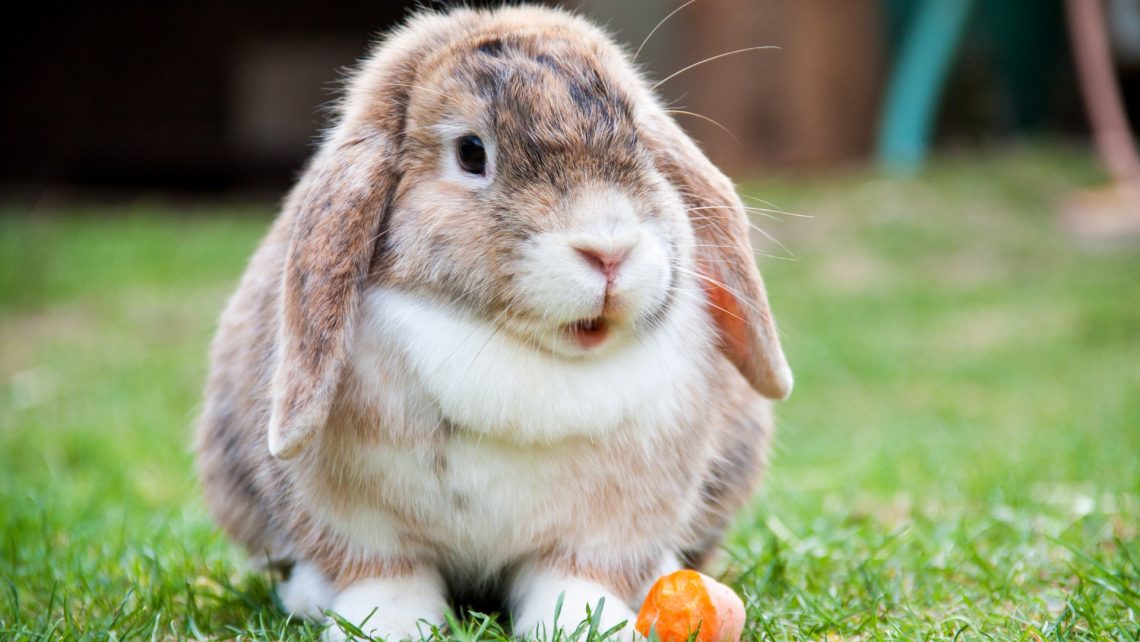Having healthy teeth is vital to the quality of life and health of bunnies. One of the main clinical problems of these pets is teeth overgrowth.
Rabbits have 16 milk teeth and 28 permanent teeth. The ones you see in the front are the Incisors. The molars and premolar teeth are aligned at the back and referred to as the cheek teeth. During infancy they have deciduous teeth (milk teeth) that are replaced by permanent teeth in adulthood, like humans do.
One of the peculiar characteristics is the continuous growth of their teeth, that will need to be balanced with the natural wear done through fibrous feed like hay, alfalfa or herbs.
Contrary to common belief, rabbits are not rodents – they are lagomorphs.
Although they behave like rodents, lagomorphs are different, because they have 4 incisor teeth in the upper jaw and rodents only have two.
Incisors
The two extra incisors that lagomorphs have are smaller and they’re called peg incisors. They are located behind the primary incisors. Primary incisors grow in average 2 to 2,4 millimeters a week.
Dental Problems
Complications can arise in other organs due to teeth problems. So check if your rabbit has any of these causes:
- Lack of hay and fibrous food in the diet (if you give too many pellets, these are easier to chew and do not produce enough wear).
- Mandibular prognathism, causing impaired teeth occlusion between jaws.
- Traumatism, that may lead to an incorrect positioning of the teeth.
- Bad dental occlusion.
Also watch for lesions within the mouth, tongue or cheeks caused by long teeth or edges that aren’t smooth, as abscesses can occur. To treat an abscess, your veterinarian will need to drain it and treat your rabbit with antibiotics and anti-inflammatory drugs; sometimes surgery and tooth extraction are warranted.
Your rabbit might have difficulty eating and even drinking, if the teeth are sticking out, and this may lead to nutritional problems.
Prevention
All animals need adequate nutrition to get all the nutrients essential for their health. But rabbits need their food to adequately erode their teeth as well as give them nutrition or their oral health could be at stake.
What should you give them?
Feeding should remain close to what it would be in natural settings. Based on hay, rich in fibre so that teeth erosion occurs naturally. However, commercially available pellets are a nutritional complement that also promotes some chewing, so don’t disregard them completely.
Pieces of wood and cardboard without additives or appropriate chewing toys are rich in cellulose and will also favor natural erosion of the teeth.
What to avoid?
Feeding them things like muesli, fruit or other treats. Muesli may cause obesity, gastrointestinal problems, rejection of other food types (like hay) that then causes reduction in water intake. If you are currently feeding muesli to your rabbit, the transition to pellets (with lots of hay available) should be done gradually, so the rabbit doesn’t reject the new alternative.
What to look out for?
- Weight loss
- Excessive salivation and wet chin
- Selectivity in foodstuffs, with a preference for softer food
- Excessive ocular discharge
- Changes in behavior, such as lethargy and apathy
- Changes in hygiene habits like disregarding grooming
What to do when problems occur?
Any of the symptoms described are cause to take your rabbit to the vet. Although they look fragile, rabbits are extremely resilient and will only show signs when diseases are well advanced. Take your rabbit to the vet, especially one who has experience in exotic pets. Never attempt to cut your rabbit’s teeth at home.
Your rabbit’s oral cavity will need careful and thorough inspection and in some cases diagnostic imaging like X-ray is also necessary.
In specific cases where the malocclusion of the teeth is due to a congenital defect, the only solution is regular teeth trimming or removal.
In conclusion
An annual checkup to look at your rabbit’s teeth and overall health is warranted. Treatment success depends on early diagnosis of the condition and adequate nutrition. Better safe than sorry, bunnies always say.
Author: Marisa Mariz, Vet Technician



Leave a Comment